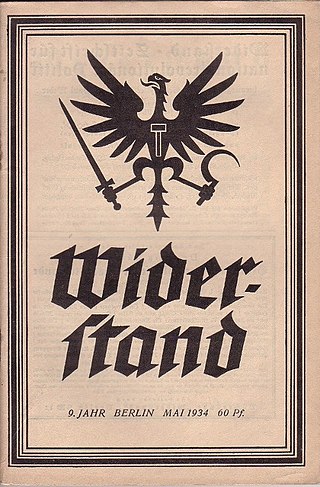Notes
- 1 2 3 4 "Rote Revue : Zeitschrift für Politik, Wirtschaft und Kultur". Seals Portal. Retrieved 14 June 2015.
- 1 2 "Portals for digital objects". Sozialarchiv. Retrieved 14 June 2015.
| Categories | Political magazine |
|---|---|
| First issue | 1921 |
| Final issue | 2009 |
| Country | Switzerland |
| Based in | Zurich |
| Language | German |
| OCLC | 5669332 |
The Rote Revue was an organ of the Social Democratic Party of Switzerland and existed between 1921 and 2009.
Rote Revue was founded by Robert Grimm and Ernst Nobs in 1921. [1] Nobs was its first editor. [1]
From 1921 to 1966, the magazine appeared under the title Rote Revue: sozialistische Monatsschrift (″socialist monthly revue″). From 1967 to 1980 it appeared under the title Profile: sozialdemokratische Zeitschrift für Politik, Wirtschaft und Kultur. From 1980 to 1989 it appeared under the title Rote Revue - Profil: Monatszeitschrift. From 1989 to 2009, it appeared under the title Rote Revue: Zeitschrift für Politik, Wirtschaft und Kultur. [1]
Rote Revue went defunct in 2009. [1] [2] All editions have been made available online by the Swiss Electronic Academic Library Service (SEALS) in 2014. [2]
Uwe Wagschal is a German political scientist.
DE magazine Deutschland was a magazine of culture, politics, business and science in Germany. It was a bimonthly magazine published in German, English, French, Spanish, Hebrew, Hungarian, Japanese, Polish, Turkish, among the others. It was styled DE Magazin Deutschland and DE magazine Deutschland, respectively. The Federal Foreign Office in Berlin supported it and it also conveyed general opinions of the German government. The magazine was based in Frankfurt but aimed at an international rather than domestic readership.
The Research Institute of Organic Agriculture, is an organic farming information and research centre. As an independent and non-profit organization, it promotes research and projects that help farmers improve their productivity with consideration of environmental and health impacts.

The 1955 Austrian State Treaty ended the four-power occupation and recognized Austria as an independent and sovereign state. In October 1955, the Federal Assembly passed a constitutional law in which "Austria declares of her own free will her perpetual neutrality." The second section of this law stated that "in all future times Austria will not join any military alliances and will not permit the establishment of any foreign military bases on her territory." Since then, Austria has shaped its foreign policy on the basis of neutrality.

Björn Böhning is a German politician of the Social Democratic Party (SPD) who has been serving as State Secretary at the Federal Ministry of Labour and Social Affairs under the leadership of minister Hubertus Heil from 2018 to 2022.

Matthias Miersch is a German criminal defense lawyer and politician of the Social Democratic Party (SPD) who has been serving as Member of the German Parliament since 2005, representing the Hannover-Land II district. He focusses on environmental policy. On October 8 2024, Miersch was appointed as provisional secretary general of the Social Democratic Party.
Dietmar Otto Ernst Rothermund was a German historian and professor of the history of South Asia at the Ruprecht-Karls University in Heidelberg. He is considered an important representative of modern German historical scholarship. Although he began his academic career as an Americanist, he eventually became a notable figure in the German historiography of South Asia. He helped to lay the foundations for South Asian Studies in Germany and Europe.
Wolfram Adolphi is a German journalist and political scientist. From 1990 until the 1991 revelation that he had been an informant for the Stasi, he was head of the Berlin chapter of the Party of Democratic Socialism (PDS), which was a forerunner to the current Left Party.

Widerstand. Zeitschrift für nationalrevolutionäre Politik was a monthly magazine established in Germany in 1926 to advocate national-revolutionary idea. It was published in Berlin, under the editorship of Ernst Niekisch. Prominent contributors included Ernst Jünger, Friedrich Georg Jünger, A. Paul Weber, August Winnig, and Joseph E. Drexel. The newspaper was shut down in December 1934. After a time in the underground, Niekisch was arrested and held in Nazi concentration camps from 1937 to 1945.
Blanche Christine Olschak was an Austrian journalist and writer, Tibetan specialist and wrote the first comprehensive encyclopedia of women in the world.
The Schweizer Monat. Die Autorenzeitschrift für Politik, Wirtschaft und Kultur, née Schweizer Monatshefte, is a Swiss monthly magazine based in Zürich. Founded in 1921 and relaunched in 2011, it maintains a liberal point of view and is edited by Ronnie Grob.

Martin Hartmann was a German orientalist, who specialized in Islamic studies.
Prague German was the dialect of German spoken in Prague in what is now the Czech Republic. The written form of this dialect from the Luxembourg rule played an important role in the history of the German language for its balancing function between the written upper Austrian and southern German dialects and eastern Central dialects of central Germany, which later developed the spelling of Modern German writing.
Fred K. Prieberg was a German musicologist. He was a pioneer in the field of history of music and musicians under the Nazi regime.

Andreas Bovenschulte is a German lawyer and politician of the Social Democratic Party (SPD) who has been serving as the President of the Senate and Mayor of Bremen since 2019.

Oliver Kaczmarek is a German politician of the Social Democratic Party (SPD) who has been serving as a member of the Bundestag from the state of North Rhine-Westphalia since 2009.

Sarah Janina Ryglewski is a German politician of the Social Democratic Party (SPD) who has been serving as a member of the Bundestag from the state of Bremen since 2015.

The Römische Kaisermedaillon is an award presented by the city of Mainz.
Das Neue Russland was a magazine which was published in Berlin, Weimar Republic, between 1923 and 1933. It was official media outlet of the Society of Friends of the New Russia. Its subtitle was Zeitschrift für Kultur, Wirtschaft und Literatur.